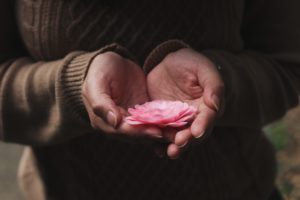by Jenny Rose | Mar 21, 2019 | Emotional Intelligence
Once I lived with an avid outdoorsman who fished and hunted. He frequently spent his weekends camping during spring, summer and fall. I knew how much pleasure he took in this time away from the rest of his life, and always saw him off with some variation of “Have a great time.”
It never failed to make him mad.
He said it “put pressure” on him when people wished him well.
I felt both dumbfounded and amused by his attitude. I couldn’t imagine feeling insulted because someone who loves you wishes you a great time.
I’ve been remembering that man this week because I’ve been thinking about giving and receiving blessings.

Photo by Chris Ensey on Unsplash
Traditionally a blessing was an important social exchange. If one was lucky enough to meet an incognito god or goddess on the flanks of Mount Olympus or in some other lonely place and received their blessing, they were broken open to receive it fully, their deepest and most private hopes, fears and pain exposed. It took courage, strength and humility to receive such a gift.
The poet David Whyte suggests we must make ourselves large for the exchange of blessings. To give such a favor is an act of generosity. To receive it is an act of growth. In the last several days I’ve thought a lot about making oneself big enough for blessings. I’ve remembered specific words and ways in which I’ve blessed others, including the simple blessing of my love.
Sometimes I’ve felt the love I gave another in words and actions was recognized, appreciated and fully received. Other times I have not, and I’ve always made that about me. My love was unwelcome and had no value. Now I wonder, though. Perhaps it wasn’t me at all. Perhaps they were not big enough in that moment to accept my blessing.
That thought leads me inexorably to wondering how many times I have not been big enough to receive a blessing from someone else. I’m forced to admit there have been plenty of times; probably many more than I’m aware of.
Am I big enough to be loved hugely, or receive a large sum of money or have my creative hopes realized?

Photo by Joshua Earle on Unsplash
I’m not sure I am. I’m big enough to be loved moderately, but hugely? No, that feels like too much. I can feel myself tensing, rounding, drawing my knees up and wrapping my arms around my body as I imagine someone trying to give me huge love. I’m not worth that. I’ll be sure to disappoint. They’ve mistaken me for someone else.
I’m too small for such abundance. I choose to be too small. I’m afraid to stand up straight, open my arms and heart wide, and accept huge love. I choose to limit what comes in. I’m afraid of the pain of being broken open. I can make myself bigger in spite of my fear, but I usually don’t in order to accommodate a blessing.
Therefore, I impoverish myself. I have people around me who love me. Perhaps they love me as deeply as I love, and they long for me to receive it as I long for my love to be received, but my own inability to be large enough to allow their blessing into my life makes the energy of their love impotent and weakens our connection. My fear and choice to be small, hard and rigid, like a rolled-up porcupine, not only limit me; they limit others as well.
My most frequent prayer on behalf of others is that they might experience the greatest good. I use that specific language because I know I don’t know what the greatest good is for any of us. Sometimes what we want the most in life is not in our best interests. Sometimes the hardest experiences are the most useful to us. Sometimes what we long for is what we most need. I don’t know. I’m not big enough to know. I can’t see far enough down the road to judge the value in any experience. All I can say, along with everyone else, is what feels pleasant and what feels uncomfortable to me in the moment.
Oxford online dictionary defines blessing as “a beneficial thing for which one is grateful; something that brings well-being; a person’s sanction or support.” We all can make a list of crises in our lives that later turned out to be blessings in disguise. Maybe it’s all a blessing – each breath, each heartbeat, each tear, each drop of blood and sweat, each moment, each life and death. Gratitude is a practice encompassing all our experience.

Photo by Ester Marie Doysabas on Unsplash
To receive a blessing is to allow an expression of support, affection and maybe even love touch us. It’s an act of trust in the intention of the one who blesses us, as well as faith in our own worth. We need one another in this life, and healthy reciprocity makes connections stronger. It’s not enough to be the strong one who maintains safety by extending love and support while accepting none; we must also be willing to be down and out, to be lost and confused, and to receive help and encouragement in our turn.
Last weekend two friends and my partner helped me empty out my flooded storage unit, chip ice, sweep water, put down pallets (transported in my friends’ truck), and put everything back again. We were ankle-deep in mud, slipped and slid on ice and splashed around in water as we worked. It needed to be done and I wanted to do it. I know I needed help. Yet from the beginning I was blocking the support and caring around me. I fussed about my friends using their Saturday to undertake such a messy job. I felt bad about using their truck. I was worried somebody would hurt their back heaving my wet mattress and box springs around. At the same time, I was deeply touched and uncomfortable because I could feel their caring and concern and I didn’t know how to take it gracefully. I wanted to be big enough to accept friendship and love from these dear ones, but it was really hard. I know, however, I’m not good at receiving and I want to be better. I also know, had our positions been reversed, I would have greatly enjoyed helping out a friend on a windy spring Saturday morning.
I endured my discomfort. Now that it’s done, what I will remember is not what was damaged and lost, or even the mess. What I’ll remember is the four of us tackled a necessary job, worked together and had a good time doing it.

Photo by Juan Pablo Rodriguez on Unsplash
It was a blessing. I stretched as wide as I could to receive it.
I need more practice.
When I tell someone I love them, or wish them a great day, or the greatest good, I mean it. It’s not just words. My heart is in it. When I light a candle and reach out with all I am to a loved one who is far away, I’m offering the best I am as a blessing, a candle in dark times, a comfort in distress. I want the gift of my love and support to be received and used.
Probably the best place to start is to learn to receive with more grace myself, to expand, and to humbly accept whatever blessings come my way, whether plainly visible or in disguise.
Have a great day, readers. Greatest good to you. Blessings.

Photo by Stephen Leonardi on Unsplash
All content on this site ©2019
Jennifer Rose
except where otherwise noted
by Jenny Rose | Feb 21, 2019 | A Flourishing Woman, Minimalism

Maine Farmhouse and Barn
I moved to Maine with a U-Haul packed with things from my old life. I was moving from a small, tight, energy-efficient home where I lived alone to a slouching, leaking farmhouse with a cracked foundation and a peeling roof. I didn’t trust my cherished possessions to the dubious protection of the house or the barn, also dilapidated and leaking.
So I rented a storage unit.
Now it’s four years later and I’ve been reading and thinking about minimalism. Minimalism appeals to me because it creates space and simplicity in our lives. I’m gradually coming to understand even my most cherished possessions are not important to my quality of life. In some ways they even block my view and obscure thresholds and openings.
That’s not to say I don’t frequently miss my just-the-right-firmness double mattress and box spring in storage, or my comfy couch and matching chair. I do miss them, but they don’t fit into my life anymore and they don’t fit into the house. Literally. I don’t think we could get my modern overstuffed couch in the old front door.
 My bed and furniture, along with a few boxes, have languished in subzero temperatures in the winter, and heat and humidity in the summer, and I’ve faithfully paid the monthly rent all this time.
My bed and furniture, along with a few boxes, have languished in subzero temperatures in the winter, and heat and humidity in the summer, and I’ve faithfully paid the monthly rent all this time.
A couple of weeks ago we had a call from the owners/operators of the storage unit to say there was flooding on the property.
Here in Maine, we have yet to experience a snowstorm this season that wasn’t mixed with freezing rain. What this means is layers of ice have built up on the frozen ground and clogged culverts and drains. As temperatures see-saw between normal below-freezing and subzero and much warmer air that turns falling snow to rain, the rain has nowhere to go.
The storm that caused the problem at the storage unit dumped several inches of snow and then three inches of rain. Cellars and basements that had never flooded before got wet. Intersections and streets flooded in town. It was a mess. At the storage unit, all that water couldn’t drain away from the buildings, so it crept along the ground and washed through them.
When we unlocked the door and pushed it open, we found ice covering the floor of the unit. The floor slopes a little, so the ice thickness varies from half an inch to two inches or possibly more in places I couldn’t see well. Everything on the floor is absolutely frozen solid to the cement.

Photo by Tom Barrett on Unsplash
For now, there’s nothing much I can do. After the initial look, I went back with a friend for moral support on another day. As I pushed up the overhead door, I had the usual pang of nostalgia and loss at the sight of the pieces from my old life, unused and abandoned. Added to that is the bitter cold and solid ice locking everything into place as though it will never let go.
The irony is inescapable. I was trying to keep those things safe from water and fire while I waited for a life they would fit into again. Keeping them safe felt like keeping me safe, or at least parts of me. Memories. History.
It’s all an illusion, though. How safe is any object? Objects get lost, broken or stolen. They get damaged. We have to manage them, care for them, protect them, carry them from place to place.
A couple of inches of ice have forced me to confront my thoughts and feelings about my stuff. Embracing minimalism is all about de-owning and decluttering, but as I go through my possessions in the house I’m in control. I can choose what to discard and what to keep. Now an act of nature has taken away some of my choice.
My cherished bed, for example, is nothing more than a mattress and box springs leaning against the wall in the back of a storage unit that got wet and are now firmly anchored in ice. When I am able to remove them and take them to the dump, all I’ve lost is the objects themselves. I’ll still remember with pleasure my wonderful bed and using all the bedding that goes with it. I’ll still remember my cat, gone now, with love and gratitude, and treasure the happy hours we spent together on that bed.

Photo by silviannnm on Unsplash
I’ve lost nothing but the necessity to store the bed for the sake of my memories and/or future possibilities. The truth is I have no use for a double bed in the life I’m living right now.
Why do we save things? Why are our lives full of things we wouldn’t buy today for the life we live now? Why do we save things “just in case?” Just in case of what? Does just in case ever come or is it merely a scary or hopeful story we tell ourselves? Do the things around us speak of who we are right now, or of who we once were or who we wish we were? Are we frozen in the past or in our fantasies?
The poet David Whyte says that most of us are at least three to four years behind our own growth and change. That struck a chord with me. My storage unit is filled with things from a life I left four years ago, a life I couldn’t go back to even if I wanted – and I don’t. I have moved on and out and up. As precious and sweet as some aspects of my old life were, they’re gone.
Except that I’ve been holding on, which has cost money and now created a situation requiring me to cut my losses and clean up. Maybe, if we took the front door off its hinges and even removed the door frame, we could have gotten my couch into the house, replaced the broken-down one we presently use, and been enjoying it all this time.
(Except the TV is always on in the living room. I hate the TV. The couch is mine. It used to be my reading place, but I can’t read in our disaster of a living room with the TV on. I don’t want it here if I can’t ever enjoy it! It’s mine. And the cat will sharpen her claws on it. And what if the house burns down?)
There is no moral to this story, aside from having learned it really is a good idea to put pallets down in a storage unit! It will be some weeks before the ice softens enough to chip off the floor and sweep out or melt. I have gone in and salvaged what I could, discarded some things, assessed some of the damage. Everything will have to come out while I dry the floor. Then I’ll need to discard whatever is ruined, buy and transport pallets and re-pack the unit.
Or maybe not. Maybe it’s time to reconsider the number of objects I’m carrying through my life. For far less than I’ve already spent on the storage unit we could have tightened up at least two of the outbuildings right here on the property for storage. How badly do I need anything I haven’t used in four years?
I’m inclined to be grateful for the flooding of my unit. It forced me to ask some important and provocative questions. It forced me to consider what’s truly important for my happiness. It challenged me to let go of things that no longer serve me without fear or regret.
When I left Colorado, I told friends I was coming to Maine because I thought I had a life here waiting for me. It’s taken me some time to find it, but I was right about that. I chose not to remain frozen in place, and that’s still my choice. Perhaps it’s time now to free my things from that old life as well.

Photo by David Hofmann on Unsplash
All content on this site ©2019
Jennifer Rose
except where otherwise noted
by Jenny Rose | Feb 14, 2019 | A Flourishing Woman, Mind
I was recently introduced to
Havening. I’d never heard the term before, but I was intrigued by a brief explanation that Havening is a neuroscientific tool to assist in repairing emotional trauma. I looked at a couple of
links and was so interested I tried the
technique myself, just to see what would happen.
The human brain’s structure, function and capability are still a mystery to us in many ways. The brain does appear to be highly plastic; that is, we learn, we unlearn and we can develop new neural pathways and rehabilitate, to a greater or lesser degree, some kinds of physical traumatic brain injury as well as emotional trauma. We obviously treat some brain-based dysfunctions by pharmacological means, in the form of prescription drugs or self-medication via alcohol, nicotine and illicit substances.

Photo by freestocks.org on Unsplash
In our current culture of emotional illiteracy, sometimes the only way we know to mitigate our emotional pain is to numb out or distract. Relieving our symptoms, however, doesn’t address the root cause of our difficulty, it only covers it up for a time. Havening is a tool that allows us to address the source of our trauma and pain without chemical substances or the need for specialized (and expensive) treatment. It empowers us, the experts on our wounds and broken places, to become our own healers.
Nowhere on the Havening website or in the video is there mention of us giving our consent to the possibility that we can change, grow and heal. However, that is in fact the first step. I have observed, in myself and others, that sometimes we become so deeply invested in our pain and limiting beliefs we’re really not willing to heal and change. We say we are. We say we want to feel better, but when it’s time to do the work of exploration, excavation and learning to make different choices in managing our thoughts and feelings, we don’t. We’re not willing to be wrong, let go of our grievances and stories, practice forgiveness and give up the satisfaction of shaming and blaming others.

Photo by Jon Tyson on Unsplash
I suspect Havening is a waste of time for those who approach it unwillingly, just as more traditional therapies are a waste of time (and money) if we’re only going through the motions.
Assuming we consent to give Havening a chance, the technique requires us to sit with ourselves in a quiet, safe place and deliberately bring to mind a single difficult memory or event. Rather than running away from our feelings, we intentionally recreate and recall them in all their vivid intensity, and as we do so we notice how our bodies process and express our difficult feelings. When we have re-experienced, as fully as possible, the feelings around our memory or event, we begin to lightly stroke or rub our arms, self-soothing with our own touch and presence. Still stroking our arms, we close our eyes and visualize walking along a beach, counting slowly to 20. Still stroking our arms, we open our eyes and, without moving our heads, look to the left, then the right, then the left. We don’t have to do this quickly or with strain. We practice this lateral gaze, combined with stroking our arms, for a minute or two, then close our eyes and visualize walking through a summer meadow, counting slowly to 20 again. We follow that with the lateral gaze for a couple of minutes, all the while still stroking our arms. The third and last visualization is of walking down a staircase, combined with arm stroking and counting slowly to 20. We follow that with practicing the lateral gaze for a couple more minutes.

Photo by Ryan Moreno on Unsplash
At the end of this series of steps, we relax and intentionally probe the memory we started with. We notice how our bodies feel and what our feelings are compared to when we started.
I know from
emotional intelligence training experiencing our feelings fully and completely is the best way to allow them to move through us and dissipate, but I frequently feel so overwhelmed by the intensity of my emotions that I’m afraid to do that. Sometimes I think if I start crying, or expressing rage, I’ll never be able to stop; I’ll fall over some invisible edge of self-control into permanent madness and chaos. Havening is enormously useful for me because it gives me a safety net to fall into. No matter how strong my feelings are about a specific memory or event, I know I’m going to be able to successfully help myself calm down and feel better immediately. I don’t need to wince away or try to minimize my feeling experience.
I’ve spent much of my life starved for loving touch. I’m not talking about sex here. I’m talking about skin to skin touch that says “I’m here. I care about you. You’re safe with me.” In times of high stress and upset, I frequently wrap my arms around myself, the closest I can get to getting a hug. Havening provides the physical comfort of touch, which we know can calm stress and produces serotonin, a natural chemical our brains make that gives us a feeling of well-being.

Photo by Liane Metzler on Unsplash
Anyone who
meditates or has done Lamaze breathing for childbirth knows when we focus on breathing or a mantra our minds learn to be quiet. The three visualizations used in Havening, combined with self-touch and counting, immediately distract from the intensity of our emotional pain, as does practicing the lateral gaze. We rarely use our eyes to look laterally without moving our heads, and to intentionally and repetitively do so takes focus.
The purpose of this specific set of steps is to “rewire” a neural pathway caused by emotional damage or trauma. The links in the first paragraph explain the science and neurology behind this better than I can, so I won’t reiterate. What I will say is, somewhat to my astonishment, I noticed a sharp decrease in the emotional pain surrounding a memory the very first time I tried Havening. I didn’t lose the memory, but it was no longer attached to such an intense emotional reaction. I could think of it and remain physically relaxed and centered. I could see it more objectively. I could say, “Yes, that happened. It hurt me, but now it’s over.” Overwhelming unpleasant feelings were no longer connected to the memory.
As I practice Havening, I notice a couple of interesting things. The first is that the memories that give me the most trouble are small. A single phrase that broke my heart and irrevocably changed everything. A memory of no words at all, just someone else’s strong emotion. I use Havening to address my most private mental slideshow, where each slide is a single small period of time; a single scene, rich in sensory detail; a single moment of terrible clarity and revelation. I marvel at the power of these small pieces to shape our lives so profoundly. I never think of Havening around divorce and break-ups or even deaths. Those obvious upheavals are not the events in my life that have had the most power.

Photo by Ludde Lorentz on Unsplash
The second thing I notice is how my visualizations are changing. The first time I did Havening, I followed the cues in the video exactly. I had no plan to elaborate on the three visualizations. As I’ve made a practice of the technique, though, my visualizations are becoming more and more vivid and sensual. I imagine walking hand-in-hand with someone. I imagine the feel of the sun, the sound of the sea, the grand sweep of a lovely curving staircase and a crowd of people waiting for me at the bottom. I also note that the unintended elaboration of the visualizations is all positive. I feel safe, protected, loved and joyous. There’s no lingering feeling of pain or discomfort from the memory or event I recalled just a minute before.
Havening is, above all, a flexible tool. Anyone can use it and fit it into his or her particular spiritual, religious or philosophical framework. It’s completely private and open-ended. Havening can be done once a week or three times a day. I can work with a single memory for a week if I need to, or tackle a new one each time I practice. It works equally well with old memories or new upsets.
Havening provides a kind of emotional detox. Since I’ve been doing it I feel lighter, more peaceful and as though I can think more clearly. I’m less easily triggered and hijacked and I respond more and react less. My head and heart are less cluttered. My feelings seem more like allies and less like enemies.
The biggest gift of Havening is the way it supports my intention to be authentic. It seems to me we all suffer some degree of
shame about the things that really hurt us. It’s hard to explain, even to ourselves, why a few words or a gesture hurt so much. We tell ourselves and others not to be silly or dramatic or have such a thin skin. Havening provides an open door, an invitation to honestly acknowledge our hurts and take
responsibility for soothing them. It gives us permission to feel our honest feelings without the need to minimize, explain or justify. We are fully empowered to respect and address our own pain.
Finally, Havening has become a ritual of self-care. I like essential oils, and I set out a blend from Young Living, a bottle of massage oil and a small hand towel by the chair I practice Havening in. I rubbed a white candle with the essential oil blend, and when I sit down I light the candle, mix the oils and use the mixture on my arms, hands, cuticles, etc. as I practice. Ten or fifteen minutes of deep moisturizing, aromatherapy and massage, in combination with Havening, leaves me feeling calm, strong, centered and cared for.
Havening is a new technique with a lot of promise. I’m interested to watch it evolve and be subject to scientific studies. Several practitioners are expanding Havening for other psychological applications, and I follow the blog with interest. In the meantime, it’s a powerful tool that costs nothing, does no harm, and results in significant benefits.

Photo by Ester Marie Doysabas on Unsplash
All content on this site ©2019
Jennifer Rose
except where otherwise noted
by Jenny Rose | Jan 25, 2019 | Connection & Community, Emotional Intelligence, Shadows
I’ve been thinking about shame. It lurks in many of my relationships. I observe it in people around me. I cannot remember a time when I was not deeply ashamed of myself. I’ve written about tribal shaming before, but I’ve never excavated the subject further until now.

Photo by Cristian Newman on Unsplash
Wikipedia has a lengthy page on shame that summarizes different ways in which it has been studied. Assessment tools exist to measure shame and its effects in our lives. Shame has been divided into categories, and distinctions between shame, guilt and embarrassment teased out.
All this information provided me with a lot of interesting context and background, but the subject is not academic for me. I have a problem with shame I want to solve. How do I go about identifying and dealing effectively with the painful feeling of humiliation or distress we call shame?
I learned in emotional intelligence training our feelings are value neutral. Some feelings are painful and others pleasurable, but that doesn’t make them “good” or “bad.” Feelings just are. We all have them, whether or not we allow ourselves to consciously feel them or admit them to others. If we allow ourselves to feel our feelings, they give us information about how we are. Feelings by themselves can empower and enlighten us, guide our choice-making and help us make strong, healthy connections with others.

Photo by John Salvino on Unsplash
Feelings come and go, like the weather, if we allow them to. Refusing to feel a feeling, however, locks it in place, and then we have forged handcuffs and chains for ourselves. The other tricky aspect of feelings is what our thoughts are about them. Thoughts are what lead us into inappropriate action and expression of our feelings.
An emotionally intelligent person recognizes a feeling like rage and takes responsibility for it. In other words, they don’t blame someone or something externally for their rage. That’s a thought. They don’t seek revenge, payback or to re-establish their power over someone they blame as the cause of their rage. They take responsibility for their feeling of rage and discharging it appropriately, knowing none of us think well or make effective choices when we’re in the grip of strong feelings. They also don’t turn the perfectly normal feeling of rage inward against themselves.

Photo by Bewakoof.com Official on Unsplash
After safely discharging rage (hard physical labor, tears, journaling, talking things over, screaming, passionate creative expression, beating up phone books or pillows), the next step is to sit down and have a talk with it. Years ago, when I lived alone, I literally began to sit down and talk with some of my feelings. I’ve written about this previously. I sit in a chair across from an empty chair and imagine myself talking things out with the feeling occupying the other chair. I say something like, “You have my attention. What’s the deal? Why are you so angry?” and then I shut up and listen to my feeling. Feelings have presence. I’ve learned to notice where I experience them in my body, what color they are, their size and shape, their density and texture, their scent and sound. Our feelings are trying to tell us things we need to know, and the more painful, difficult and overwhelming they are the more important their message is.
This is what I have been doing lately with shame. I wait and watch for it, and when it comes I notice and pause. In the middle of a conversation with my partner, I’ll feel shame rise up like a foul smell and I’ll pause and look for what is happening that triggers shame. Something I said? Something I didn’t say? Something he said to me? Something else I’d rather be doing? A subject I don’t want to talk about or don’t care about? What else am I feeling?
After doing this for a couple of weeks, I discover any honest conversation that makes visible my needs and feelings triggers shame. No wonder I feel so burdened if shame is attached to every need and feeling!
Interestingly, during the in-the-moment pauses while I explore all this, more often than not I realize I don’t in fact feel shame at all. It’s become a kind of chronic hitchhiker attached to other feelings.

Photo by Nabeel Syed on Unsplash
A good example is driving. I typically go the speed limit or 5 miles over it, and in bad weather much slower than that. I rarely run late. I hate to rush. I enjoy music and audiobooks in the car and am quite happy driving. I love my commute. The world is full of people, however, who are in a hurry, reckless, and, to my way of thinking, rude. Of course, they think I’m rude for not getting out of their way!
I rarely drive without feeling shame, but I realize now I’m not really ashamed at all of my driving. On the contrary, I think I’m a competent, courteous driver. I’ve also been a lucky driver, because accidents happen to the best drivers out there and I’ve never been involved in more than a fender bender. When someone is crawling up my backside in a snowstorm in the dark on an icy road and I’m blinded by their headlights in my rearview mirrors and have no way to move over and let them by, what I do feel is mad and scared. The shame is about feeling mad and scared, not about my driving choices in that moment. I don’t want some idiot in a big truck to have the power to intimidate me on the road. I resent living in a world where I have to worry about sudden violence and road rage, or being a woman alone at night. I’m furious with people who follow too close, even in good conditions. I hate to be pushed and pressured, and I hate even more to feel I’m in someone else’s way or making someone wait on me. That’s an old trigger for PTSD.
It turns out much of my daily shame is nothing more than a habitual default. A rueful realization, but also good news. Habits can be broken, I’ve had a lot of practice with that.
I’ve never yet successfully broken a habit without replacing a not-so-useful thought or frame with a better one. So, what’s the opposite of shame? If I want to replace shame with something more effective, what would that be?
Shame is akin to contempt. Contempt is the atomic bomb in relationships between two or more people as well as in our relationships with ourselves. Contempt withers love and destroys trust. It’s never constructive. Those who employ it seek power and control over others. Shame and contempt are merciless. Guilt, the recognition of having transgressed against another, can be addressed. We can atone for our actions and words, apologize, take steps to repair the damage we caused. Shame and contempt are without mercy or the possibility of reparation. Guilt says we’ve behaved badly. Shame and contempt say we are bad, we are unworthy, and nothing can ever make us different.
I consulted a thesaurus to look at antonyms for shame and came up with respect. Respect!
Shame: Why are you so stupid and difficult? You’re always in everyone’s way! You don’t belong on the road. Why are you such a goody-two-shoes? No wonder nobody likes you, crawling along like an old lady! Nobody else drives this way. Joe Blow (partner, brother, colleagues, the guy at work who said the roads were fine and scoffed at slow drivers) wouldn’t be driving like this. You do everything wrong. People like you cause accidents because you go too slow.
Respect: Don’t let this idiot drive your car! Go as slowly as you need to. You’ve got good judgement and a lot of experience. These are dangerous conditions and feeling fearful is an appropriate response. I trust you. Don’t let this driver intimidate you. His need to go fast is not more important than your need to stay safe. People driving the way he is cause accidents.
Quite a difference, right?
I suppose there are more elegant ways to grapple with feelings like shame and a trained psychologist or psychiatrist would laugh at me, but I’ve found helping myself is incredibly empowering. My experience of therapy is that having a good guide is invaluable, but even the best guide can’t crawl inside our heads and do the work of staying present and making different choices. That’s all on us. Ditching an ineffective habit is difficult and so is encouraging a new one, but it’s perfectly doable. If I lost my right hand, I would eventually learn to use my left. It would feel clumsy, and no doubt be frustrating, and it would take time, but I would learn to do it. Our brains are surprisingly plastic, and we’re learning more all the time about healing and adapting neurologically and emotionally.
We aren’t born with a feeling of shame. We learn to feel it. Anything we learn can be unlearned. Shame stunts our growth and our joy. Respect is like the wind beneath our wings. I’ve made my choice.

Photo by Yuan Yue on Unsplash
All content on this site ©2019
Jennifer Rose
except where otherwise noted
by Jenny Rose | Nov 29, 2018 | Choice, Power
Choice: an act of selecting or making a decision when faced with two or more possibilities (Online Oxford Dictionary).

Photo by Jon Tyson on Unsplash
This morning I’ve been reading about doing one thing at a time and having too many choices. I’ve considered the paradox of choice: how important it is to understand our power to choose for ourselves and how unhealthy too many choices can be. I’ve thought about all the subtle ways I limit choice overload in my own life. For example, we have a large DVD collection. I like to watch my favorite movies and series over and over again, so I move through the shelves in alphabetical order when considering what I want to watch next. I do the same thing in our fiction library. My partner, on the other hand, likes to have as much choice as possible and can’t understand why I deliberately narrow the field in terms of entertainment or anything else.
It’s not mysterious. I do it because I don’t like the feeling of floundering around with too many choices. If I want to relax in front of a movie, I don’t want to have to endure an hour of deliberation first. I know I’m healthier and happier when I keep life simple. We know many people, faced with too many buying choices, walk away without buying anything. That’s me. I have a low tolerance for hassle and unnecessary complications.
Choosing is powerful, but there’s also a tricky, dark side of choice. When we’re compelled, addicted, manipulated or numbed, we become divorced from our ability to identify two or more possibilities and our power to choose. We’re asleep at the wheel of our own lives, abdicating both the struggle of choosing and owning the responsibility for our choices and their consequences. We stop learning. We become victims. We all know people like this. They protest their behavior is not their fault. They couldn’t help it. Somebody or something else made them do it. They refuse to be accountable.
According to the above definition, choice is an action. It’s something we do, which implies it can also be something we don’t do. Yet doing, not doing or refusing to choose are all choices. I had a boyfriend once who avoided choice. He wouldn’t say yes to going to the movies. He wouldn’t say no, either. I used to tell him refusing to choose was also a choice that resulted in steering my own choices, but he wouldn’t accept it. He focused his blame on me for the choices I made — in response to his.
The truth is we’re responsible for our behavior and decisions, whether they arise out of conscious choice or not.

Photo by Heidi Sandstrom on Unsplash
Modern American culture does an interesting thing. Our rightful power to choose has become shackled to consumerism. If you want to have a healthier body, for example, a wide array of diet programs, supplements and exercise equipment, clothing and technology is available to you. Want to become more effective and organized? There’s an app for that! Want love and connection? Buy it with diamonds, perfume, makeup, a phone plan, an insurance policy or a car!
We follow blindly along with all this because we’re brainwashed by our media consumption and the overculture. Our choice to improve our physical self-care leads to economic choices, not behavioral changes, even though we all know a gym membership is not useful unless we actually go to the gym and change our behavior! We are seduced onto distracting avenues of endless shiny, tantalizing, seductive promises of exactly what we want, if only we buy the right things.
In the meantime, our lives wither, we become enslaved by money, and the only choice we can recognize is whether to buy brand A or brand B. Our brief flicker of power in deciding to take better care of ourselves is extinguished by guarantees, reviews, special deals, customer service and returns. We give our time and energy to sorting through glittering products, rather than doing the inner work of noticing our self-destructive behavior and learning to manage our choice making more effectively.

Photo by Gemma Evans on Unsplash
I wonder if the power to make free and conscious choices is not the most important thing we can learn — and teach. To be disconnected from our ability to say yes or no is to be enslaved. Enslavement is, of course, the goal of advertising and marketing. Corporations wouldn’t pour billions of dollars into advertising if it didn’t richly reward them. Controlling our buying choices is big business, and our economy rests on it.
Becoming more conscious of our non-consumer choices is perfectly possible, but it requires we wake up and pay attention. It requires a silent place in our lives for inquiry and reflection. It requires a step back from our busy, multi-tasking lives, distractions and deeply-rooted habits. We can’t make free choices if we’re unwilling to be wrong or afraid of unforeseen consequences. We can’t manage choice if we refuse to be honest with ourselves and others. Most of all, we must be willing to take responsibility if we want to manage choice effectively and appropriately.
No one can take away our power to choose unless we allow them to. In every circumstance we can choose something, even if it’s just refusing to be disempowered by difficult events and experiences. It’s never too late to claim our ability to choose, including limiting our exposure to marketing, advertising and algorithms and finding ways to avoid choice overload. Chocolate or vanilla is a lot easier to choose between than 31 flavors.
The holidays are here, and with them even more choices to make than usual. It’s a good time to stay awake, pay attention to what we’re doing and why, and exercise our right to choose what works best for us, even if it’s wildly different from anything we’ve ever done before. We don’t need anyone else’s permission to choose for ourselves, and nobody has the right to choose for us.

All content on this site ©2018
Jennifer Rose
except where otherwise noted






















